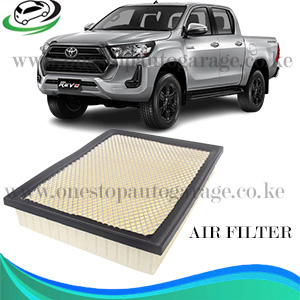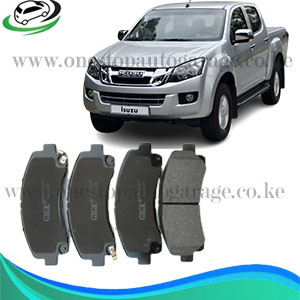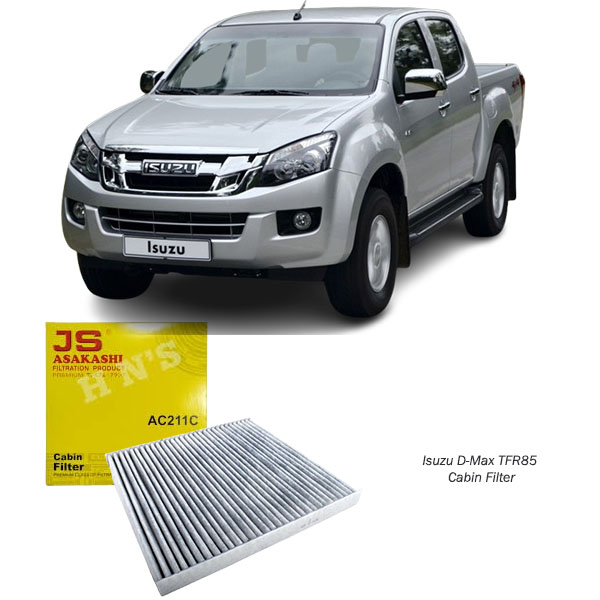-10%
Get Isuzu D-Max TFR85 Cabin Filter AC-211C in Kenya
The cabin air filter, though often overlooked, is a crucial component of a vehicle’s HVAC (Heating, Ventilation, and Air Conditioning) system. It plays a significant role in ensuring clean air inside the cabin, contributing to passenger comfort and health. This detailed guide explores the functions, benefits, types, maintenance practices, and replacement processes for cabin air filters.
What is a Cabin Air Filter?
A cabin air filter is a rectangular or square filtration device designed to purify the air that enters the vehicle’s interior through the HVAC system. It captures a wide range of contaminants, such as dust, pollen, dirt, mold spores, and even harmful gases.
Typically made of pleated paper or synthetic material, some advanced filters also include activated carbon or charcoal to neutralize odors and harmful pollutants. The filter is housed in a designated compartment, usually located behind the glove box, under the dashboard, or under the hood, depending on the vehicle model.
Functions of a Cabin Air Filter
- Air Purification
- The cabin air filter traps particles like dust, dirt, and allergens, ensuring that the air inside the vehicle is clean and breathable.
- Improving Passenger Comfort
- By eliminating unpleasant odors and pollutants, the filter creates a more pleasant environment for passengers.
- Protecting HVAC System Components
- It prevents debris from entering the HVAC system, reducing wear on the blower motor, evaporator, and other components.
- Enhancing Visibility
- A functional air filter ensures that the defogging system works efficiently by supplying clean air to the windshield, improving visibility in adverse weather conditions.
- Health Benefits
- By filtering out allergens and harmful particles, it reduces respiratory issues for passengers, particularly those with allergies or asthma.
Benefits of a Cabin Air Filter
- Cleaner Cabin Environment
- Captures airborne contaminants, resulting in a fresh and hygienic interior.
- Odor Elimination
- Filters with activated carbon or charcoal neutralize unpleasant smells, such as exhaust fumes and smoke.
- Prolonged HVAC Lifespan
- Protecting the HVAC system from debris minimizes the risk of clogs and component damage, reducing the need for costly repairs.
- Enhanced Airflow
- A clean filter ensures unrestricted airflow through the HVAC system, improving heating, cooling, and ventilation efficiency.
- Healthier Travel
- Passengers benefit from reduced exposure to allergens, dust, and pollutants, ensuring a healthier travel experience.
Types of Cabin Air Filters
- Particulate Filters
- Basic filters designed to capture dust, pollen, and other large particles.
- Ideal for everyday driving in areas with minimal pollution.
- Activated Carbon Filters
- Contain layers of activated carbon to absorb odors and harmful gases like carbon monoxide and nitrogen dioxide.
- Suitable for urban environments with high levels of traffic pollution.
- Electrostatic Filters
- Use an electrostatic charge to attract and trap smaller particles, including bacteria and mold spores.
- Recommended for individuals with respiratory issues.
- HEPA Filters
- High-Efficiency Particulate Air (HEPA) filters capture over 99% of particles as small as 0.3 microns.
- Offer the highest level of air purification, ideal for high-pollution areas.
Signs of a Dirty or Failing Cabin Air Filter
- Reduced Airflow
- A clogged filter restricts air circulation, resulting in poor performance of the HVAC system.
- Unpleasant Odors
- A musty or foul smell from the vents often indicates a dirty or moldy cabin air filter.
- Foggy Windows
- Difficulty in defogging the windshield and windows may be caused by restricted airflow from a clogged filter.
- Increased Allergic Reactions
- Passengers may experience more frequent allergy symptoms due to reduced filtration of allergens.
- Noisy HVAC Operation
- The blower motor may work harder and produce unusual noises when the filter is clogged.
Causes of Cabin Air Filter Deterioration
- Environmental Factors
- Driving in dusty or polluted areas accelerates the accumulation of debris on the filter.
- Moisture Exposure
- Humidity or water ingress can lead to mold and mildew growth on the filter.
- Extended Usage
- Over time, the filter loses its effectiveness as it reaches its capacity to trap contaminants.
- Poor Maintenance
- Neglecting regular inspections and replacements contributes to premature filter failure.
Maintenance and Care for Cabin Air Filters
- Regular Inspections
- Check the cabin air filter during routine vehicle maintenance, especially if driving in harsh conditions.
- Replacement Schedule
- Follow the manufacturer’s recommendations, typically every 12,000–15,000 miles or once a year. Adjust the frequency based on driving conditions.
- Cleaning (if applicable)
- Some filters are washable and reusable; clean them as per the manufacturer’s instructions.
- Keep Vents Clean
- Regularly clean the vehicle’s exterior air intake vents to minimize debris entering the HVAC system.
- Store in Clean Conditions
- If storing a vehicle for an extended period, ensure the cabin air filter is clean to prevent mold and odors.
Replacing a Cabin Air Filter
Replacing a cabin air filter is a straightforward process that most vehicle owners can perform themselves. Here’s a step-by-step guide:
Tools Needed
- Screwdriver (if necessary for access panel removal)
- New cabin air filter (as specified for your vehicle)
Step-by-Step Process
- Locate the Filter
- Refer to the owner’s manual to find the cabin air filter compartment. Common locations include behind the glove box or under the hood.
- Access the Filter
- Remove the access panel by unclipping or unscrewing it.
- Remove the Old Filter
- Carefully slide out the old filter, noting its orientation for correct installation of the new one.
- Inspect the Compartment
- Clean the compartment of any dust or debris before installing the new filter.
- Install the New Filter
- Insert the new filter, ensuring it is correctly oriented (follow the airflow direction markings).
- Reassemble the Compartment
- Secure the access panel and ensure everything is properly fitted.
- Test the HVAC System
- Turn on the HVAC system to check for proper airflow and operation.
Cost of Replacement
The cost of a cabin air filter varies depending on the type and quality:
- Basic Filters: $10–$30
- Activated Carbon Filters: $20–$50
- HEPA Filters: $30–$100
Labor costs for professional replacement typically range from $20–$50, depending on the vehicle model and accessibility.
Environmental Considerations
- Recycling Used Filters
- Dispose of old filters responsibly, as some parts may be recyclable. Check local regulations for recycling options.
- Choosing Sustainable Filters
- Opt for reusable or eco-friendly filters to reduce waste and environmental impact.
Conclusion
The cabin air filter is an essential yet often underestimated component of a vehicle’s HVAC system. Its role in ensuring clean, fresh air inside the cabin is vital for passenger comfort, health, and the longevity of the HVAC system. Regular inspections, timely replacements, and understanding its functions can enhance your driving experience and contribute to overall vehicle performance. Investing in high-quality cabin air filters ensures a healthier, more enjoyable journey for all passengers.
Follow us on Facebook for more parts.



